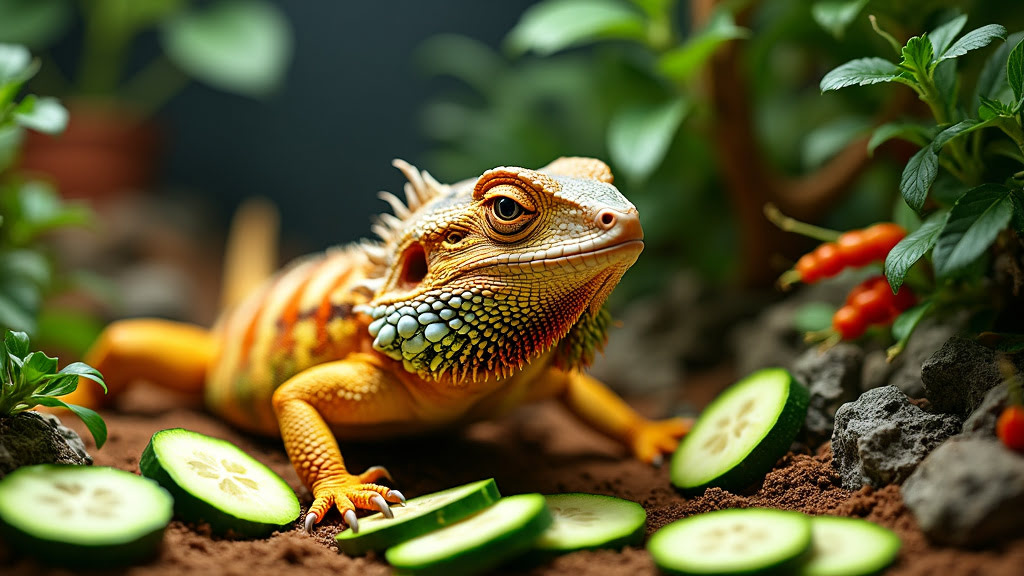Owning a bearded dragon is a delightful experience that comes with responsibilities. As popular pets, bearded dragons need a balanced diet to stay healthy. You might wonder, “Can bearded dragons eat zucchini?” You’ve come to the right place! Let’s dive into everything you need to know about feeding zucchini to your scaly friend.
The Nutritional Needs of Bearded Dragons
Bearded dragons are omnivores, which means they eat both plants and small animals. Understanding their dietary needs is essential to keep them healthy and happy.
Essential Nutrients
Proteins: Vital for growth and repair, usually from insects.
Vitamins: Especially vitamins A, B, C, D, and E, which are crucial for overall health.
Minerals: Include calcium and phosphorus, which are important for bone health.
A balanced diet for bearded dragons should be about 20-25% protein and 75-80% vegetables and leafy greens. Fruits should be given sparingly, as treats.
Zucchini in the Diet of Bearded Dragons
Can bearded dragons eat zucchini? Drumroll, please… Absolutely, yes!
Nutritional Profile of Zucchini
Zucchini is packed with beneficial nutrients, making it a good addition to your dragon’s diet. Zucchini is rich in:
- Vitamins: Especially high in Vitamin A and Vitamin C.
- Minerals: Contains potassium, manganese, and folate.
- Fibre Content: Zucchini is a good source of dietary fibre, aiding digestion.
Benefits of Zucchini
Including zucchini in your dragon’s diet can offer several benefits:
- Digestive Health: The fibre content aids in proper digestion.
- Nutrient-Rich: Provides essential vitamins and minerals.
- Hydration: Zucchini has a high water content, helping to keep your dragon hydrated.
Potential Downsides
Despite its benefits, there are a couple of concerns with zucchini:
- Low Calcium Content: Zucchini is low in calcium, which is crucial for bone health. Balance it with other high-calcium vegetables.
- Oxalates: Zucchini contains oxalates, though in lower amounts compared to some other vegetables. Moderation is key.
How to Safely Prepare Zucchini for Bearded Dragons
Preparation is crucial to ensure zucchini is safe for your scaly friend. Here’s how to do it right:
Selecting the Best Quality Zucchini
Always choose fresh, organic zucchini if possible. Avoid any that look wilted or have spots.
Proper Cleaning and Preparation Methods
- Wash Thoroughly: Make sure to wash the zucchini under running water to remove pesticides or contaminants.
- Slice Thinly: Cut the zucchini into thin, manageable slices or small chunks before serving.
Serving Suggestions
You can serve zucchini in various ways, such as:
- Raw: Cut into small, manageable pieces.
- Grated: Easily digestible and can be mixed with other veggies.
- Cooked: Lightly steaming can make it softer but avoid adding any seasoning.
Frequency and Portion Control
Knowing how much and how often to feed zucchini is just as important as the preparation.
Portion Sizes
For adult bearded dragons, a small piece of zucchini a couple of times a week is enough. For juveniles, a thumb-sized portion once a week is ample.
Frequency of Inclusion
Zucchini should be treated as a treat rather than a staple. Aim for variety by frequently rotating it with other safe vegetables to maintain a balanced diet.
Monitoring for Adverse Reactions
- Stool Consistency: Watch for changes in stool that may indicate digestive issues.
- Behavioural Changes: Lethargy or refusal to eat may be a sign of dietary problems.
Other Safe Vegetables for Bearded Dragons
Zucchini is not the only veggie in the garden! Here are some other options that are safe and nutritious for your dragon:
- Kale: High in calcium and vitamins.
- Collard Greens: Rich in fibre and essential nutrients.
- Bell Peppers: Packed with vitamins A and C.
- Yams: Another high-nutrient veggie that’s beneficial when given in moderation.
- Green Beans: High in fibre and vitamins A, C, and K.
Remember, variety is the spice of life—or at least the key to a balanced diet for your dragon!
Vegetables to Avoid
Not all greens are good. Some vegetables are harmful to bearded dragons and should be avoided:
- Spinach: High in oxalates, which can bind calcium.
- Beet Tops: Also high in oxalates.
- Avocados: Contain persin, which is toxic to bearded dragons.
- Rhubarb: Contains oxalic acid that can lead to kidney failure.
Personal Experience
From my own experience, feeding zucchini to bearded dragons has been easy! My dragons seem to enjoy the mild taste and crunchy texture. Over the years, I’ve noticed positive impacts on their hydration levels and overall wellbeing.
A little tip from me: mix zucchini with other veggies for a colourful, interesting meal. My dragons love it—think of it as their own special treat!
When to Consult a Vet
Zucchini and other veggies can be a fantastic addition to your dragon’s diet, but it’s important to watch for signs of dietary issues:
- Changes in stool consistency.
- Unexpected weight loss.
- Lethargy or changes in behaviour.
If you notice any of these signs, consult a vet immediately. Regular health check-ups and consultations with an exotic pet veterinarian are vital for your dragon’s long-term health.
Conclusion
To wrap things up, yes, bearded dragons can safely enjoy zucchini as part of a balanced diet. However, moderation is key due to its oxalate levels and low calcium content. Always vary their diet with a range of safe vegetables to ensure they get all the nutrients they need.
For more information on what bearded dragons can eat, visit our internal link. Don’t forget to share your experiences in the comments below—let’s create a vibrant, knowledgeable community of bearded dragon enthusiasts!




